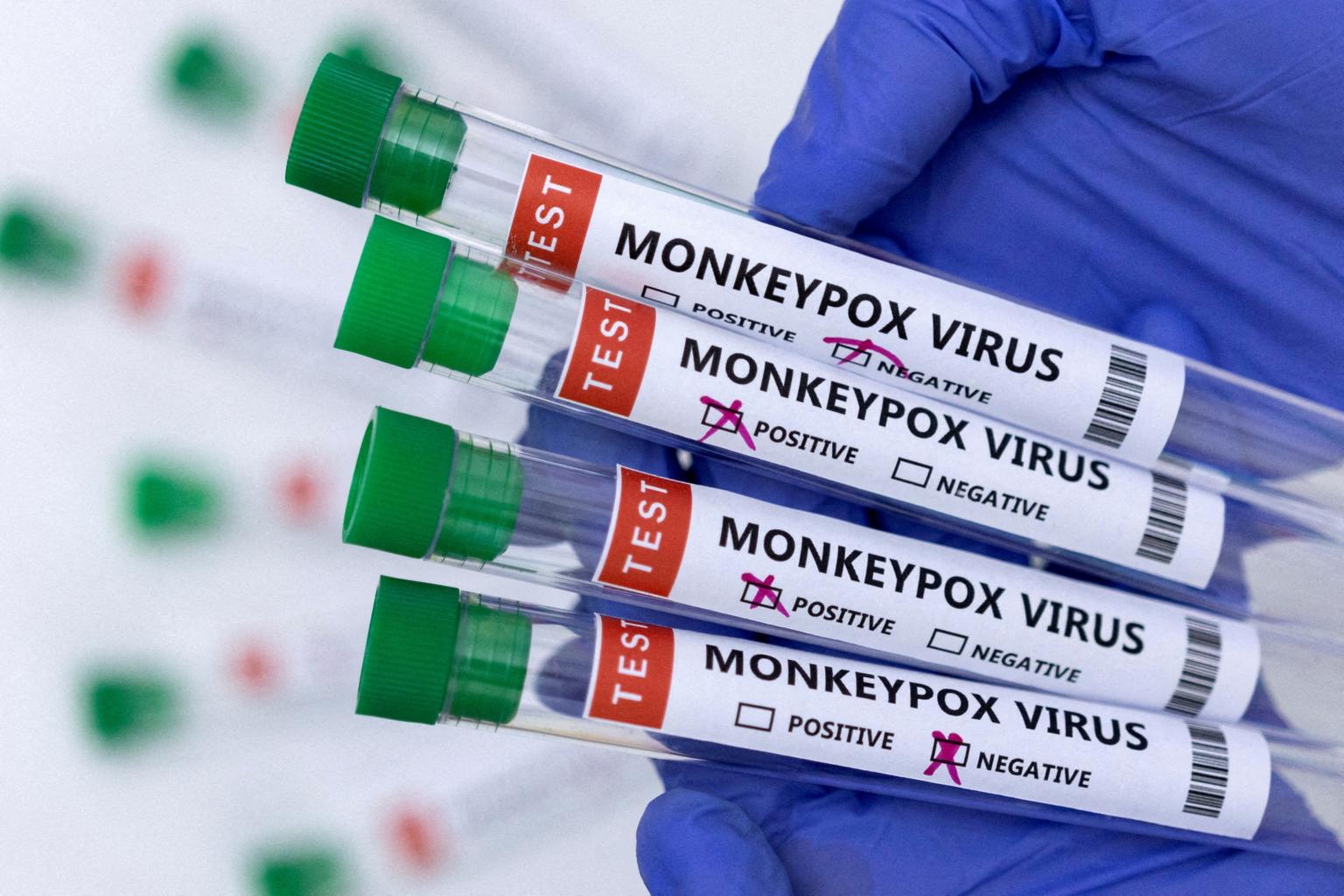askST: Should Singaporeans worry about monkeypox?
Sign up now: Get ST's newsletters delivered to your inbox

Globally, there are now more than 6,000 cases recorded in 59 countries, with the epicentre currently in Europe.
PHOTO: REUTERS
SINGAPORE - Monkeypox cases continue to spring up in Europe and, on Wednesday (July 6), Singapore reported the first local case - a 45-year-old man who lives here. He is not linked to the country's first imported case, which was announced on June 21, and contact tracing is ongoing, said the Ministry of Health (MOH).
Globally, there are now more than 6,000 cases recorded in 59 countries, with the epicentre currently in Europe. Experts are concerned because the virus is spreading from human to human, and cases are popping up in places that had not seen the virus previously. Monkeypox has been endemic in Central and West Africa.
The World Health Organisation (WHO) had deemed the outbreak not a public health emergency of international concern in late June. However, on Wednesday, its director-general Tedros Adhanom Ghebreyesus said he will hold a second meeting of the emergency committee on monkeypox during the week of July 18, or sooner if needed.
Q: Should Singaporeans worry about monkeypox?
A: Health Minister Ong Ye Kung said monkeypox is unlikely to become a global pandemic like Covid-19, as transmission requires close or prolonged physical contact with infectious persons or contaminated material.
The WHO said the spread from person to person has been known in the past to generally require prolonged close contact, such as face-to-face contact in close proximity, or skin-to-skin physical contact.
Mr Ong also said that monkeypox is typically a self-limiting illness where patients recover within two to four weeks. Some people can fall seriously ill or even die, and those particularly vulnerable to complications are young children, pregnant women or immuno-compromised individuals.
So far, though, the data from Europe, where the majority of monkeypox cases were reported, show that 99 per cent are men, and many self-identified themselves as men who have sex with men.
The WHO said the outbreak continues to primarily affect men who have sex with men who have reported recent sex with one or multiple male partners. This suggests that there is no signal of sustained transmission beyond these networks for now, it added.
Q: Why is monkeypox spreading a lot among men who have sex with men?
A: Sexual contact is an example of close physical contact, through which monkeypox is spreading.
There is currently no evidence to show that the disease is sexually transmitted, but direct skin-to-skin contact with lesions during sexual activities can spread the virus, said the WHO.
The risk of monkeypox is thus not limited to people who are sexually active or men who have sex with men, it added.
The WHO also said that monkeypox rashes are sometimes found on genitals and in the mouth, which is likely to contribute to transmission during sexual contact.
Furthermore, monkeypox rashes can resemble some sexually transmitted diseases, including herpes and syphilis. "This may explain why several of the cases in the current outbreak have been identified among men seeking care in sexual health clinics," it said on its website.
Q: What if monkeypox continues to spread here?
A: Associate Professor Hsu Li Yang, an infectious diseases expert at National University of Singapore's Saw Swee Hock School of Public Health, said while monkeypox spreads via close contact, it does not spread as efficiently as chickenpox, Covid-19 or even the flu.
"So, we will have sporadic cases and clusters while the international outbreak is ongoing, but not a large uncontrollable epidemic in Singapore," he added.
"The current infections are also mild, compared to historical reports. Outside of Africa, there has hardly been any deaths."
Reports of severe illnesses have also been few, he noted.
The WHO has confirmed three deaths, in Africa.
Q: What can I do to protect myself?
A: Avoid close contact with people known or suspected to have monkeypox. MOH also advises the public to exercise personal responsibility by monitoring their personal health and maintaining good hygiene, especially when they are travelling.
If you do need to have physical contact with someone who has monkeypox because you live together, for instance, you should encourage the infected person to self-isolate and cover any skin lesion if he or she can, according to advice from the WHO.
"When you are physically close to them, they should wear a medical mask, especially if they are coughing or have lesions in their mouth. You should wear one also," the WHO said.
"Avoid skin-to-skin contact whenever possible and use disposable gloves if you have any direct contact with lesions. Wear a mask when handling any clothes or bedding if the person cannot do it himself or herself."
Q: Will people here need to be vaccinated against monkeypox?
A: MOH currently does not recommend mass vaccination against monkeypox because the risk to the general public is low. This is also in accordance with the global guidance from the WHO.
Professor Dale Fisher, an infectious disease expert from National University Hospital, told The Straits Times previously that the world does not have a large stock of smallpox vaccine - that is used now for monkeypox - because smallpox has been eradicated for decades now.
He added that vaccination could be used as an early treatment in immuno-compromised patients to prevent their health from further deteriorating.
Q: Why is the smallpox vaccine being used for monkeypox?
A: This is because monkeypox is a cousin of smallpox, though a much milder one. Its virus is closely related to the virus that causes smallpox and past data has shown that the smallpox vaccine is about 85 per cent effective in preventing monkeypox.
In Singapore, the authorities have said that the smallpox vaccine may be used for certain groups of people, such as those who will directly and frequently work with infectious monkeypox cases or specimens. MOH has said that it is evaluating this vaccination for protection before potential exposures on a case by case basis.
Q: How can Singapore reduce the spread of monkeypox now that it is here?
A: MOH said cases will be isolated in hospital, and their close contacts will be quarantined for up to 21 days from the last date of exposure, for monitoring. These contacts are also offered smallpox vaccines to reduce their risk of infection or severe symptoms.
Q: Why would a vaccine be given to a person who was in close contact with someone infected with monkeypox?
A: Experts believe that vaccinating a person - particularly one who is at higher risk of severe disease - ideally within four days of exposure, may prevent the disease from taking hold in the person. This is known as post-exposure prophylaxis or PEP.
The WHO said PEP may be given for up to within two weeks of exposure, particularly to those at risk of ongoing exposure.
Q: Did monkeypox come from monkeys?
A: Monkeypox is a zoonotic disease, which means it spreads between animals and people. It was first identified in monkeys in 1958 but the source of the disease remains unknown, and it is most often transmitted by rodents.
The first human case of monkeypox surfaced in 1970, in the Democratic Republic of Congo - a nine-month-old boy in a a region where smallpox had been eliminated in 1968.
The disease was brought to international attention only in 2017, when large numbers of cases were reported in Nigeria at the end of that year, particularly as two cases were "exported" to Britain, said Prof Hsu. The number of human cases has fallen since.
However, monkeypox is now being reported in previously unaffected regions, and spreading.
Q: Has Singapore seen any monkeypox cases?
A: The Republic reported one imported case - a Nigerian tourist - back in 2019.
Prof Hsu said the cynomolgus monkeys or long-tailed macaques that led to the identification of monkeypox back in 1958 had either transited through Singapore or were caught locally.
Two outbreaks occurred among the monkeys at Statens Serum Insititut in Denmark then. The researchers then identified the monkeypox. In the paper written on this, they said the monkeys came from Singapore.
Q: Am I protected against monkeypox if I have been vaccinated against smallpox?
A: The WHO said people who have been vaccinated against smallpox are likely to have some protection against monkeypox. Younger people would not have been vaccinated against smallpox because smallpox vaccination stopped worldwide after the dreaded highly contagious disease became the first human disease to be eradicated in 1980.
In Singapore, compulsory smallpox vaccination for children ended in March 1981.
Q: Does chickenpox vaccination offer any protection against monkeypox?
A: No, the viruses that cause chickenpox and monkeypox are vastly different, said Prof Hsu.
Q: What are the signs and symptoms of monkeypox?
A: The incubation period (interval from infection to onset of symptoms) is usually from six to 13 days but can range from five to 21 days, according to the WHO.
The symptoms can include fever, intense headache, back pain, swollen lymph nodes, muscle aches, low energy and skin rash or lesions.
However, the monkeypox cases in the current outbreak have been atypical.
The WHO said many cases in newly affected areas are not presenting the classically described clinical picture for monkeypox (fever, swollen lymph nodes, followed by centrifugal rash). In past cases, the skin eruption typically started within one to three days of the appearance of fever.
Currently, among the cases who reported at least one symptom, 81 per cent had systemic rash (widespread rash on the body), 50 per cent had fever and 41 per cent had genital rash, said the WHO.
Also, the atypical symptoms seen now include a localised rash with as little as one lesion.
Q: What symptoms did the local monkeypox patient have?
A: According to MOH, he first developed lower abdomen skin lesions on June 30, and experienced fatigue and swollen lymph nodes on July 2.
On July 4, he developed fever and a sore throat and sought medical attention where initial tests for other possible medical conditions were done and turned out negative.
He was sent to the National Centre for Infectious Diseases on July 6.



